




Why Are Vitamins and Minerals Important for Your Health?
Before learning about vitamins and minerals, let's understand nutrients.
Nutrients provide nourishment to our bodies which is essential for development, growth, and good health. There are six types of basic nutrients- carbohydrates, proteins, fat, vitamins, minerals, and water. But the main focus is on Vitamins and Minerals.
Vitamins are nutrients found in foods such as vegetables that are needed for physical and mental development. They are what keep us healthy!
Minerals are substances found in the earth or absorbed by animals or plants that humans eat to develop the body properly.
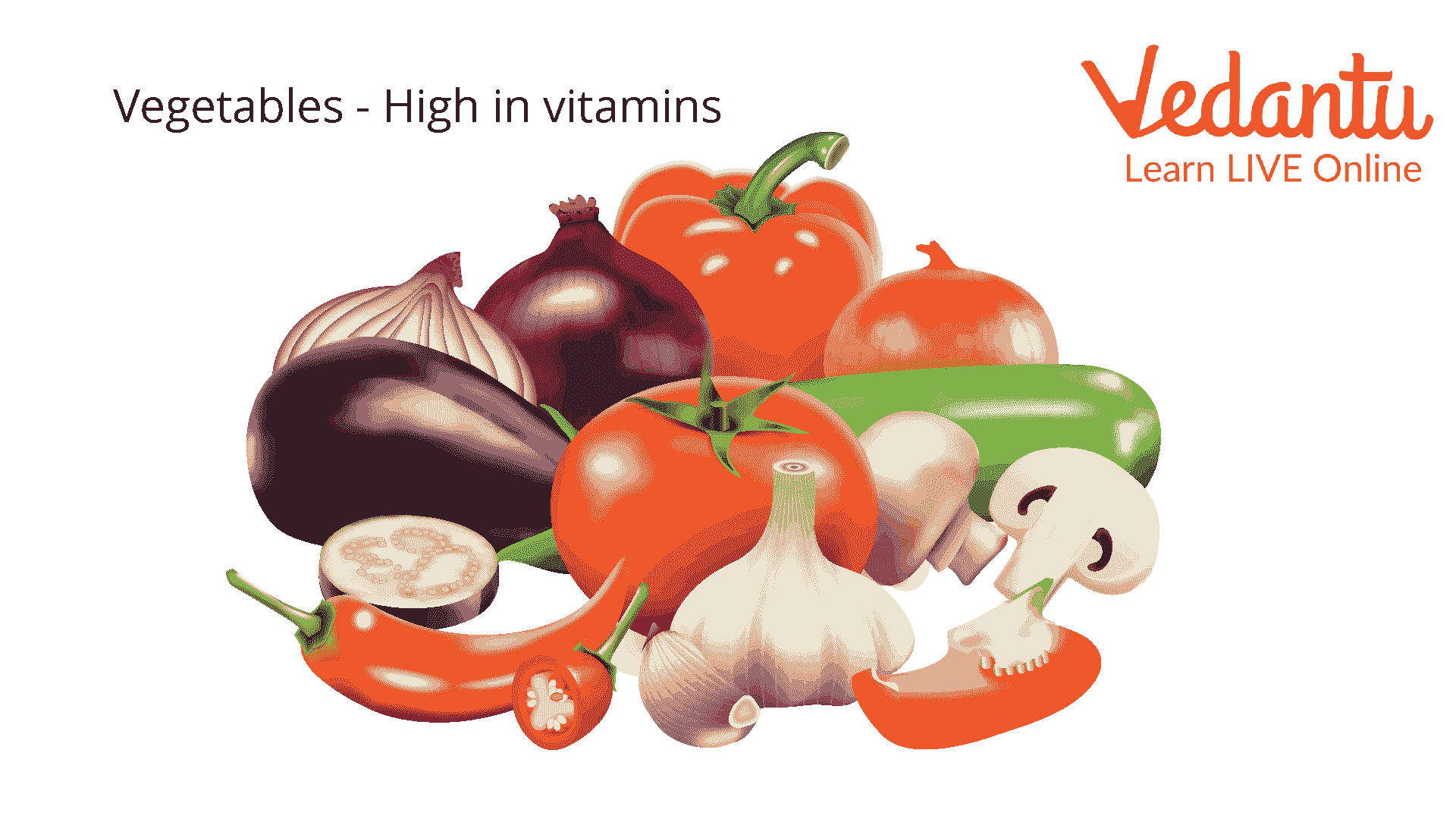
Vegetables - High in Vitamins
Types of Vitamins
Our body requires several different kinds of vitamins to function well and fully develop. Each vitamin has a different role and comes from a different food source.
Vitamins are divided into two categories- water-soluble and fat-soluble.
Fat-Soluble Vitamins are dissolved in the fat and stored in the body for later use. These are Vitamins A, D, E, and K.
Water Soluble Vitamins are dissolved in the water present in the body and they help to provide energy. These are Vitamins B and C.
Types of Vitamins, Sources, and Functions
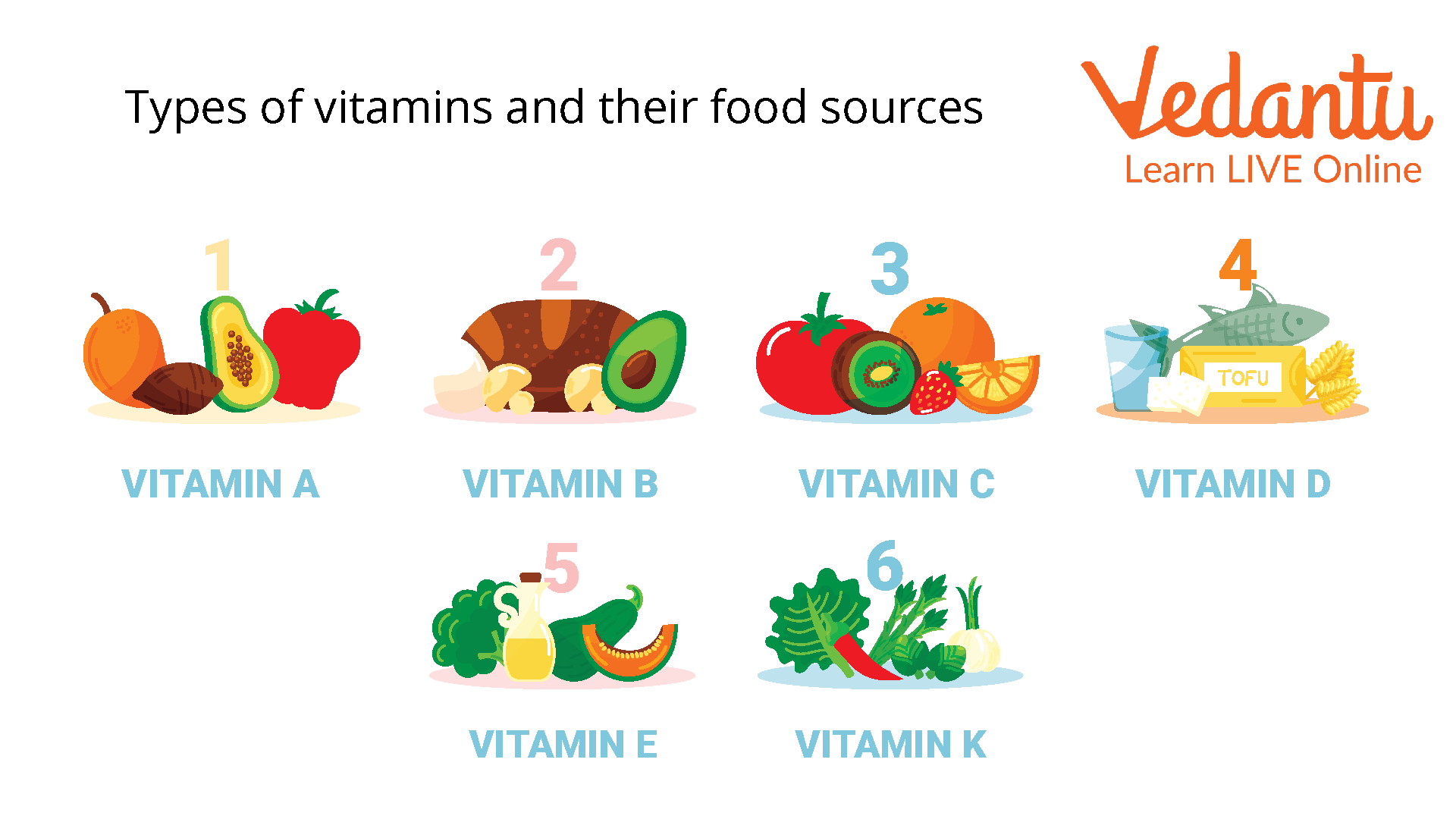
Types of vitamins and their Food Sources
Why Do We Need Vitamins?
Vitamins are essential for the human body, and they have several benefits.
Benefits or Uses of Vitamins :
Maintains skin and hair health.
Reduces stress.
Improves heart health.
Improves eyesight.
Keeps the bones strong.
It helps in brain function (memory, concentration).
It helps to avoid diseases and infections.
Deficiency of Vitamins
It is not just important to eat vitamin-rich foods but also to eat them correctly.
When the body doesn't get enough of the right vitamins, it fails to function correctly.
Such diseases caused due to the lack of vitamins in the body are called deficiency diseases.
The lack of each vitamin causes a specific deficiency disease. Let’s learn about the diseases and their symptoms.
Deficiency Diseases of Vitamins
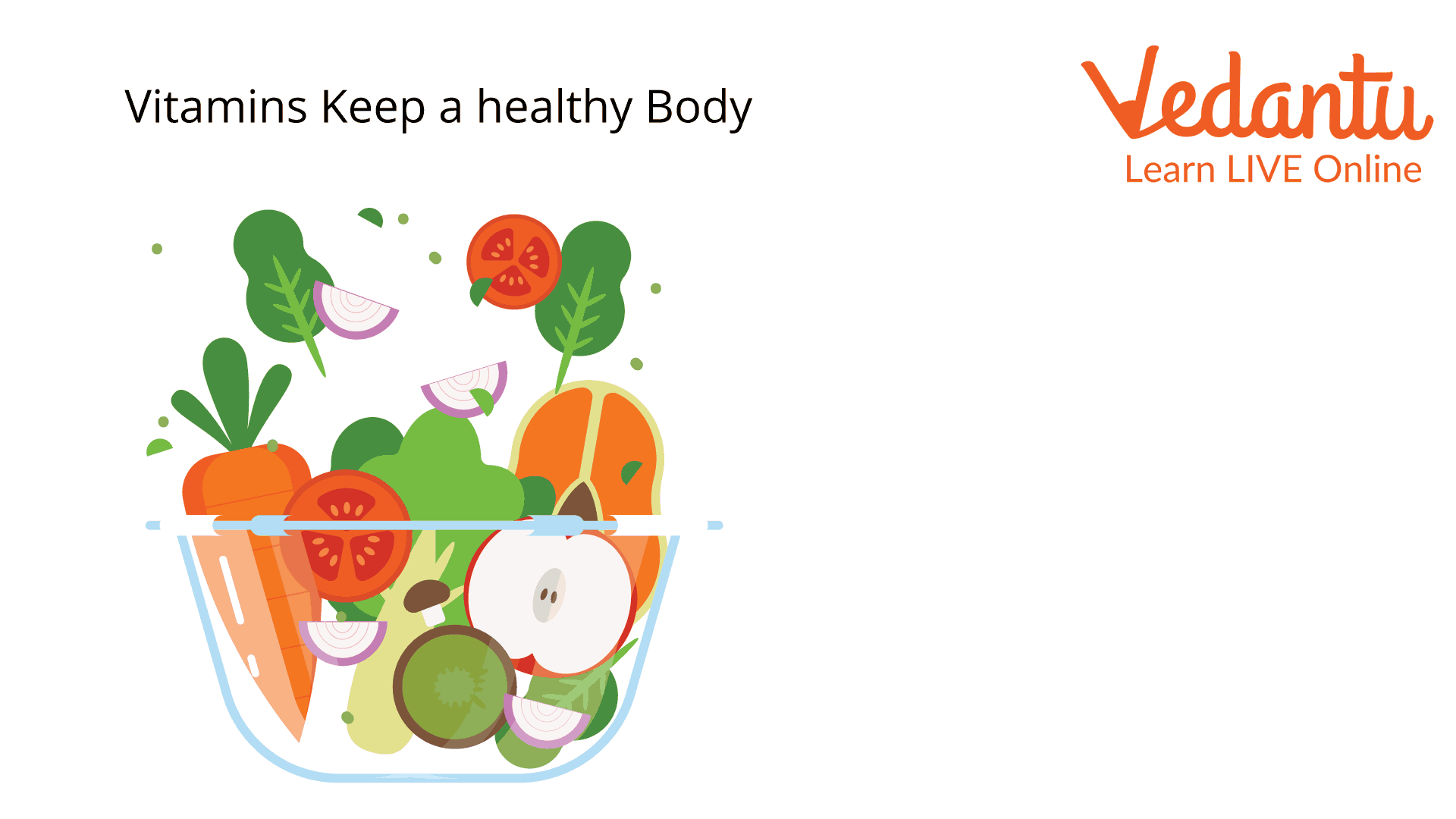
Vitamins keep a Healthy Body
Types of Minerals
Just like vitamins, minerals are also needed for the functioning and development of muscles, bones, heart, and brain.
It is essential to consume minerals from different food sources.
Minerals are of two types- Macro minerals & Minor or Trace minerals.
Macro minerals are needed in large amounts. They are - Sodium, Phosphorus, Magnesium, Calcium, Potassium, and Chloride.
One of the essential minerals is calcium. It plays a significant role in developing bones, muscles, brain function, circulation of blood, and much more. Calcium should be consumed in the right amount from its respective food sources.
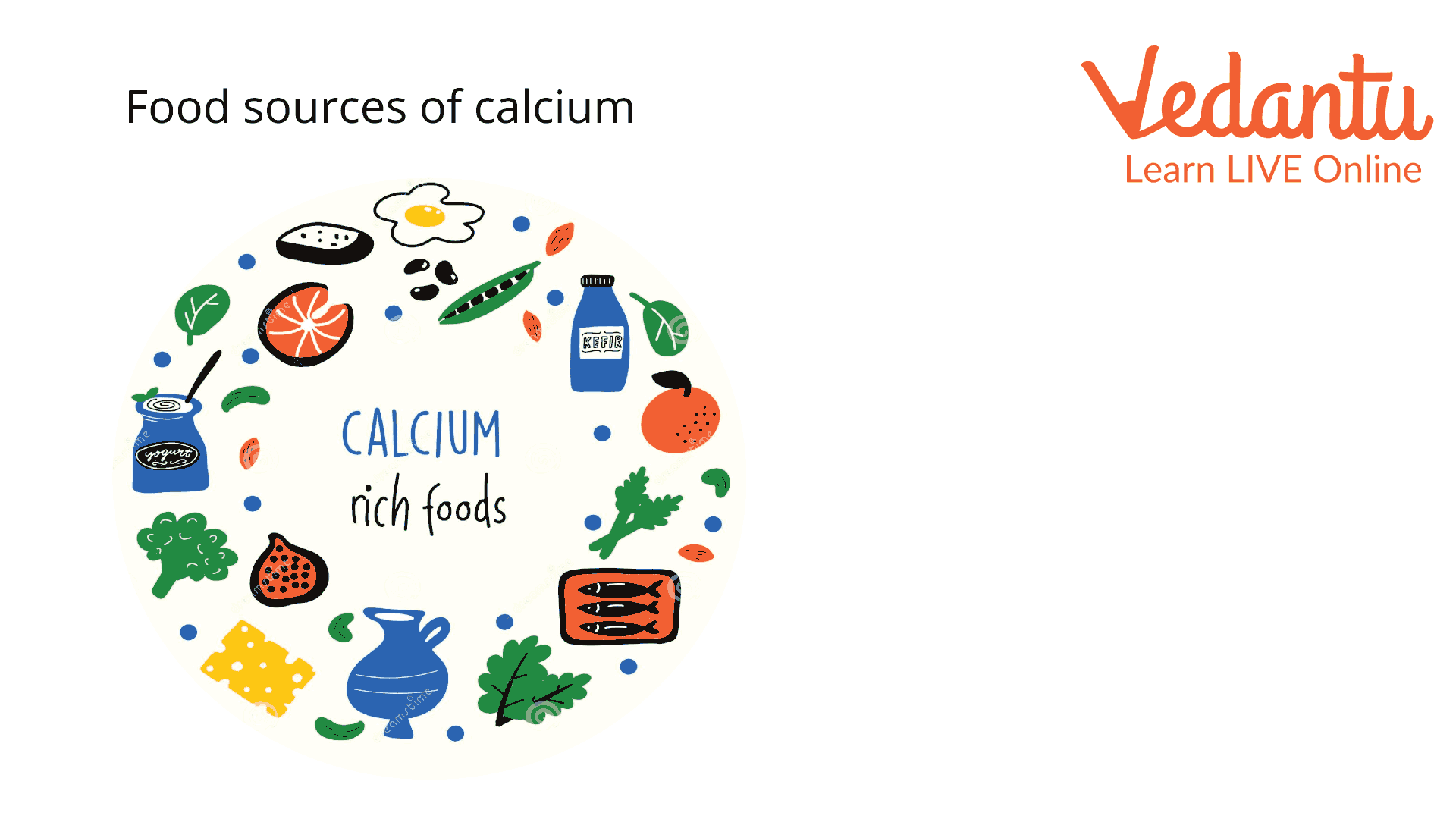
Food Source of Calcium
Minor minerals are necessary for small quantities. They are - Iron, Copper, Zinc, Iodine, and Fluorine.
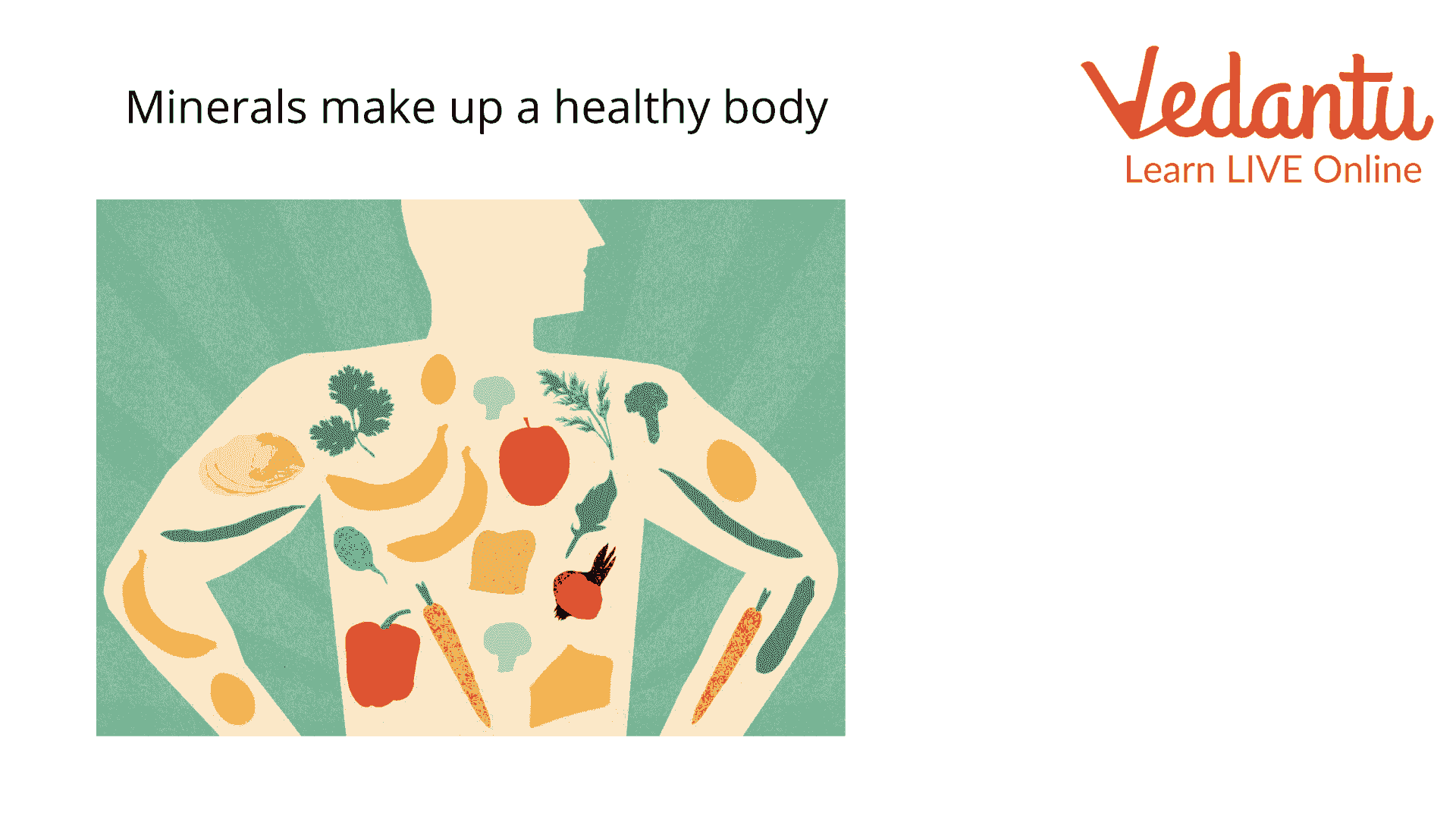
Minerals Make up a Healthy Body
Types of Minerals, Sources, and Functions
Deficiency of Minerals
Just like vitamins, the lack of minerals also causes problems in the body.
These are caused as we do not consume enough minerals required for proper body development.
Each mineral has its specific deficiency: calcium deficiency, Zinc deficiency, Iron deficiency, and more.
Interesting Facts
Sunlight is the critical source of Vitamin D.
The very first vitamin, Vitamin A, was discovered in 1913.
Kiwis and Strawberries contain twice as much Vitamin C as Oranges.
Milk is a universal food containing all nutrients, including minerals and vitamins.
Vitamins D and K are the only vitamins the body can make.
Iron deficiency is the most common mineral deficiency seen in the world.
Conclusion
Vitamins and minerals should be included in our food every day. Without these nutrients, we could face several physical problems or diseases in the body.
They are essential for bodily functions like developing strong bones and muscles, healthy skin and hair, proper eyesight, repairing wounds, and many more.
Each type of mineral and vitamin should be equally essential and consumed correctly.
FAQs on Vitamins and Minerals: Key Facts Every Student Should Know
1. What are vitamins and minerals, and why are they important for kids?
Vitamins and minerals are essential nutrients that our bodies need to grow, stay healthy, and have energy. Think of them as tiny helpers for important jobs. They are especially crucial for kids because your body is busy building strong bones, making new blood, and fighting off germs. A balanced diet full of these nutrients helps you see clearly, heal from scrapes, and concentrate better in school.
2. What are some easy-to-find foods that are full of vitamins and minerals?
You can find these amazing helpers in many colourful and tasty foods you eat every day. Here are some simple examples:
- Vitamin C: Found in oranges, amla, lemons, and bell peppers to help fight off colds.
- Vitamin A: Found in carrots, spinach, and sweet potatoes, which is important for healthy eyes.
- Calcium (a mineral): Found in milk, yoghurt, paneer, and ragi for building strong bones and teeth.
- Iron (a mineral): Found in green leafy vegetables like spinach, as well as beans and lentils, to give you energy.
3. What are the main types of vitamins and what do they do in our body?
There are many different vitamins, and each has a special job. Some of the most important ones for growing children include:
- Vitamin A: Essential for good eyesight, especially in low light, and for maintaining healthy skin.
- Vitamin B-complex: A group of vitamins that help your body get energy from the food you eat.
- Vitamin C: Acts like a shield for your body, helping you heal from cuts and boosting your immune system to fight infections.
- Vitamin D: Often called the 'sunshine vitamin', it works with calcium to build and maintain strong bones.
- Vitamin K: Very important for helping your blood to clot properly when you get a cut or scrape.
4. What is the main difference between a vitamin and a mineral?
While both are essential, they are different in nature. Vitamins are organic substances, which means they are made by living things like plants and animals. For instance, plants create Vitamin C. Minerals, on the other hand, are inorganic elements that come from the earth—soil and water. Plants absorb these minerals from the ground, and we get them when we eat the plants or the animals that ate them.
5. Why can't we just eat one favourite fruit to get all the vitamins we need?
This is a great question! It is because different foods contain a different mix of nutrients. For example, an orange is packed with Vitamin C but has very little Vitamin D or Iron. Your body needs a wide range of vitamins and minerals to perform all its functions. This is why a balanced diet with a variety of colourful fruits, vegetables, grains, and dairy products is so important to make sure you get all the different helpers your body needs to grow strong and healthy.
6. What happens in our body if we do not get enough of an important vitamin or mineral?
If our body consistently doesn't get enough of a specific nutrient, it can lead to a condition called a deficiency. This means the body can't perform certain jobs correctly. For example, a lack of the mineral Iron can lead to anaemia, making you feel very tired and weak. Similarly, not getting enough Vitamin D can result in weaker bones because the body cannot absorb calcium properly.
7. Is it possible to have too many vitamins and minerals?
Yes, it is possible. While your body needs vitamins and minerals to be healthy, it only needs them in the right amounts. Consuming an excessive amount, usually from taking too many supplements rather than from food, can sometimes be harmful. It's always best to get your nutrients from a varied and balanced diet, as your body is excellent at absorbing what it needs from natural food sources.









